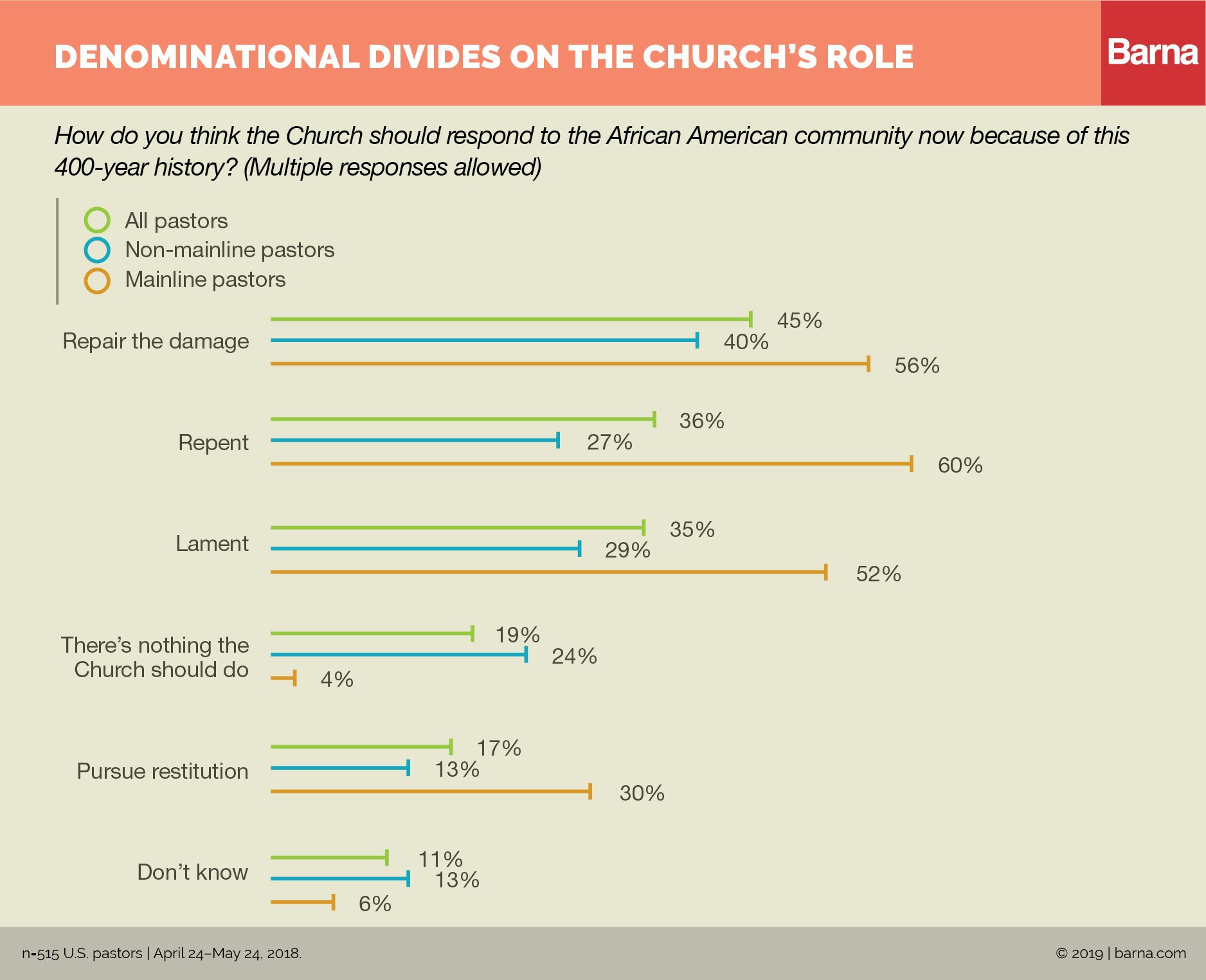Racial reconciliation matters to church leaders. A new Barna study released this year reveals pastors and church leaders are more likely than other Christians to believe the church should work to repair the damage done to the African American community at the hands of slavery and racism. The study reveals two-thirds of pastors (65 percent) believe the effects of slavery continue to be felt today, while only half (50 percent) of practicing Christians agree with that belief.
“Acknowledgement is vital to the forgiveness process…Acknowledgement allows a person to see and absorb what has happened so that they are ready for grace to be applied. Even before God forgives our sin, there has to be an acknowledgement,” Pastor Mark Strong of Life Change Church told Barna.
The study, conducted April 2018 – August 2018, surveyed 1,007 adults, 1,502 practicing Christians, and 600 senior pastors, all in the United States. For its pastor sample, Barna says it “oversampled” to include 100 respondents who are black pastors.
Slavery Was Introduced to America 400 Years Ago
The timing of Barna’s study is significant: 2019 marks the passing of 400 years since African slaves were brought to the United States. “Many historians note the summer of 1619 as the beginning of slavery in America,” the study’s report states. Due to this milestone, Barna says “many are taking time to reflect on the history of racial injustice in America and their responsibility in healing the wounds of inequality that have been inflicted on black Americans over the last four centuries.”
However, opinions vary widely in the church about whether the effects of slavery are still felt in the African American community and what role, if any, the church should play in correcting these effects. As can be expected, opinion on this subject tends to fall along racial lines; a previous Barna study showed 59 percent of black U.S. adults strongly disagreeing with the belief that racism is a thing of the past, while only 39 percent of white adults strongly disagreed.
The new study asked practicing Christians how the Church should respond to the African American community now, in light of its 400-year history. Thirty-three percent of white practicing Christians responded there’s nothing the church should do, while only 15 percent of black practicing Christians said the same. Twenty-eight percent of all practicing Christians believe there’s nothing the church should do while only 19 percent of all pastors feel the same way.
Pastors Are More Empathic to Racial Reconciliation
Barna interprets the data it collected on practicing Christians and pastors this way: “Pastors appear more empathic than practicing Christians not only about the reality of racial inequality, but also about the Church’s role in addressing it.” Because the majority of pastors believe the effects of slavery are still being felt today, there are also more likely to believe the church should play a role in addressing the problem.
For instance, 45 percent of all pastors surveyed believe the church should work to “repair the damage” of the African American community, while only 26 percent of all practicing Christians feel the same. There is quite a lot of variance in how people believe the damage should be addressed, however, and these nuances tend to fall along denominational lines. For instance, while 36 percent of all pastors believe the Church should repent, only 27 percent of non-mainline protestant pastors believe this. Sixty percent of mainline protestant pastors believe repenting is in order. (For more thoughts on a non-mainline protestant pastor’s views on repenting for “generational sins”, you can read about Al Mohler’s thoughts.)
There is a greater consensus among non-mainline protestant pastors that lament should be employed (29 percent). Mainline pastors also look to lament as a viable option (56 percent). As far as tangible action is concerned, 30 percent of mainline pastors believe pursuing restitution with African Americans is in order, while only 13 percent of non-mainline pastors agree with that thought.
The study’s report also points out the influence pastors have in their congregant’s thoughts on racial reconciliation and the social justice debate in general. “Practicing Christians who say that “justice” is a frequent topic in their leaders’ teaching are less likely to dismiss the Church’s role in reconciliation (24 percent vs. 40 percent of practicing Christians who never hear about justice say there is nothing to be done),” the report says.
As far as why pastors are more apt than other Christians to say the fallout of slavery and racism still continues today, perhaps the answer lies in the fact that as spiritual leaders, pastors are more in tune to the needs, problems, and hardships of other people. Thus, they’re more concerned about racial reconciliation.


